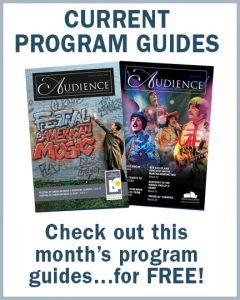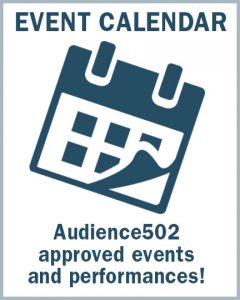Graham Parker – CEO
Louisville Orchestra
By G. Douglas Dreisbach
The Louisville Orchestra, founded in 1937, has a rich history of innovation and excellence, known for its commitment to contemporary music and premieres of new works including a recent concert compilation with Louisville’s own Jack Harlow. Under the leadership of Music Director Teddy Abrams, it continues to push boundaries and receive countless accolades.
The upcoming season promises a vibrant mix of classical masterpieces, groundbreaking premieres, and community-focused programs, showcasing the orchestra’s dedication to engaging and inspiring audiences across Kentucky and beyond.
Listen to the full interview below.
We recently caught up with CEO, Graham Parker, who came on board in 2021 with energy and enthusiasm and has garnered numerous awards including a Grammy award just last year. He is excited about the current state of the Louisville Orchestra, Louisville as a whole and what lies ahead for everyone involved.
Doug Dreisbach: We are always excited to hear what’s going on with the Louisville Orchestra, and you all have certainly been busy with recent concerts including one with Louisville’s own Jack Harlow, and the Pops Series, various themed concerts, and of course, the classics. As the Chief Executive Officer of one of the best orchestras in the world, what are your roles and responsibilities?
Graham Parker: A chief executive, especially for an orchestra like the Louisville Orchestra, is often a very bifurcated or multitask operation every day. I manage a team of around 30, just on the staff, and then I, of course, report to a board. I also have 40 other folks to whom I’m accountable, and that requires a lot of day-to-day interaction with emails, phone calls, meetings, etc. Then I, of course, have the orchestra, as well. They don’t technically report to me, but they are the heart and soul of us as an arts organization. The orchestra is what we’re about and a critical component of what I’m up to, a lot of days.
I also work very long-term with Teddy Abrams, our Music Director, on programming ideas. I will often meet with composers and discuss big project ideas, framing them, shaping them, and dreaming big. I do a lot of fundraising, as you might expect, running a nonprofit. I also do things like this, chat with the press, or speak to a Rotary Club, or speak to a business group. Really, no day is the same, which is what I love about this job.
But every day is very busy, and often you move from one thing to the next that are very different disciplines. I just have to move seamlessly from one thing to the next and try to do my best to be present and informed, and to hopefully inspire and encourage folks to get more involved in the arts.
DD: When you collaborate with the composers like Teddy and Bob Bernhardt and others, what does that look like? Are you guys in a room just throwing ideas out and seeing what sticks? It’s got to be pretty exciting, hearing some of the suggestions coming from everyone.
GP: I mean, Doug, if I told you the truth, I think you and your readers would be really disappointed (laughs). No, I mean, in all seriousness, really our artistic North Star is Teddy. He is the guy that we rely on to have big ideas and have breakthrough imaginative concepts. And oftentimes, we’ll start with regular meetings. We have monthly programming meetings, and we’re always working on the season right in front of us, the one, two in front of us, three in front of us. We’re always anywhere between one and three years out. We’ll be talking about soloists that we’re excited about, or a composer that might want to write a piece for us, or a big anniversary… is coming up next season in 2026. There’s always lots of ideas.
Yes, we have composers that are on our staff and part of the Creator Corps, so we’re always talking to them about ideas they have as well. Then obviously, I work with Bob Bernhardt on our Pops Series, and we’re always in touch with agents and managers about new artists or ideas they have, and then we have a film series. When it comes to programming, it’s very iterative. Yes, we’re often in a room together. I really do think that in-person is the best way to do it, because you can look at people’s faces, gauge their reactions, that kind of thing.
One of the things Teddy and I try hard to encourage each other, just between the two of us, as well as with our colleagues, is that no idea is a bad idea. You’ll come up with 100 not-great ideas until you come up with the one that really sticks. And those 100 that didn’t quite land were not bad ideas. They just maybe weren’t the right one.
We really encourage our team to have the sense of, “Be a little fearless. Have the courage to speak up. Share your ideas, and let’s operate strongly together.” Ultimately, Teddy decides, and that’s the right way it should be. He is the Music Director. He’s the artistic North Star of the organization, and ultimately, if he and I don’t agree, he makes the decision.
DD: Speaking of decisions and creative processes and ideas, in November of last year, you had Louisville’s own, Jack Harlow, come in and do a couple of very innovative concerts with the orchestra, which was a huge success and awesome to see. How did the Jack Harlow composition and collaboration come about, and in hindsight, are you going to pick up new fans and subscribers because of the concert?
GP: This is a great example of how well Teddy and I work together. Teddy had formed a friendship with Jack after they had been at some events and things together and had started chatting. I think Teddy was invited to one of Jack’s birthday parties and they just started texting and just checking in now and again. I don’t know which one of them said it, but one of them said to the other one, “We’d love to do something together,” and the other person said, “Oh, my gosh, that would be incredible.” And so, when I arrived, Teddy explained this to me, and I was like, “Well, that’s a brilliant idea. What’s happened with it?” He goes, “Well, right now it’s just me and Jack,” and I was like “Well, OK, and could you speak to his manager, and I’ll meet up with him and let’s chat about how real this really is?” So I met up with Chris Thomas, who’s a well-known manager and has been Jack’s manager for quite some time, and we really hit it off. I kind of understood how these kinds of concerts could fit into Jack’s vision of his place in the Louisville music scene and how it fits into when you’re dealing with artists like Jack and the album cycles and big, huge arena tours he might be planning.
We had to work really carefully about when this was going to happen, and Jack — this is the kind of artist he is. They plan on a much shorter timeline than we do. We plan at least two years out. We definitely had some work to do to line up when this would happen, and then we had to get Jack and Teddy to really talk about what this evening was going to be. What kind of music was Jack going to sing? We obviously expected his music, but how did he want the orchestrations to sound? What was the tone of the evening? And that took about two years, and it kind of came down to eventually deciding everything, Jack and Teddy, and then Brad Ritchie, who was an extraordinary arranger who arranged every note of those charts, really coming together on an artistic vision, and then I worked with bringing all of our teams together with their agents and promoters and managers and press people and media to line up the announcement date, because we knew it was going to be very, very popular and wanted to be sure that people who were in the queue would have a chance to buy tickets and all the rest of it.
And then, for those who were in the audience, it was two spectacular nights, and I think showed Jack off in a way that I think some people were not expecting. I mean, certainly there’s been a lot of chat about the two standards he did, the Elvis number and then “Fly Me to the Moon.” Both of those have certainly got a lot of buzz, and we are very aware of the videos out there, which is very exciting. We were just thrilled to share a stage with Jack. He does so much for Louisville. He regards Teddy as an absolute musical peer, which is extremely generous, and the two of them have built a strong friendship, and I am really excited to see where this might go.
DD: I see a lot of concerts that are family oriented, and then, of course, your classic orchestra masterpieces, and then some movie genres and a variety of other themed concerts. Is that to attract different audiences and different patrons?
GP: Yes, that is exactly right, Doug. We don’t think of our audience as a monolithic block. Folks in Louisville have very different tastes, very different interests, different price points they’re willing to spend on an evening out or an afternoon out. Some have kids. Some don’t have kids. Some are younger. Some are older. We try and break down our offerings that we think that different audience members would enjoy. Those who come to our pops shows with Bob Bernhardt generally don’t come to our classics shows. And we find similarly, a lot of folks who come to our classics shows are not pops folks. The film is interesting. A lot of people will try out different things, and that’s also a great place to bring your kids with you. If it’s a Harry Potter show, maybe the parents might know their kids are happy, but they also get to see the full orchestra, and the kids get to see that, too, and then we of course do loads of actual family shows aimed directly at the younger folks in our community.
We also do a lot of free concerts. One thing that Teddy and I have really prioritized is the ability for us to bring the orchestra to parts of Louisville. We have prioritized the west side of Louisville, where folks have been historically left behind by the arts. We have really made a tremendous investment in offering nine or 10 free concerts every year in West Louisville, in community centers, we have a new venue in the neighborhood house in the Portland neighborhood and are really trying to find a way so that we can bring the orchestra to that community, rather than asking them to come downtown to us. We want to remove all the economic barriers, so everything is free, and we’re very, very proud of that, too.
DD: What are some of the reactions you see from the West End groups or other groups and communities that you travel to that may have never seen an orchestra before?
GP: We see everything from, “Thank you for coming,” to “Thank you for remembering that we’re part of this city.” Folks will reminisce about the last time they saw an orchestra, or maybe, growing up, coming to our Making Music concerts when they were in fourth or fifth grade. Some younger folks might be learning an instrument, and that’s really exciting, for them to see a professional play that instrument, and get up close and ask questions. Sometimes it’s just an excuse for a whole family to come together and spend an evening out, because there’s no cost, so no babysitters need to be hired, or no one needs to be left at home. Everyone can come out.
Very different reactions, but I have to say 99.9% of the time, it’s very, very positive.
DD: That has to be a very rewarding and fulfilling feeling when you see folks that are exposed to something that you’ve created and brought to them. In addition to the recent Jack Harlow collaboration and everything else, last year, you and Teddy and Yuja Wang collaborated and were the recipients of a Grammy Award. Is that one of the peaks of your career, as far as rewarding things you’ve done?
GP: It is definitely a highlight, yes. I feel very, very fortunate in my career that I’ve gotten to work with some incredible artists, and I’ve led some innovative projects and many things and received some very nice accolades. But getting a Grammy is one of those things that everyone knows what that means, and it’s the same Grammy that a Beyoncé can win or the Louisville Orchestra can win. It’s the same value, in essence, to reputation, to a signal of quality and acceptance by the music community of really high standards. And I think, for Teddy to write a piece for his old college friend, Yuja Wang, who is probably the greatest pianist on Earth — it’s an immensely difficult piece. We recorded it live during COVID. I mean, it was kind of — if you would try and recreate it, no one in their right mind would do it. But that’s what ended up happening, and the producer was in New York. He didn’t even come to Louisville, because he was all worried about traveling, so we recorded this thing live, and then to get nominated for a Grammy, and then to go to the Grammys, and then to win — yeah, it was a pretty special evening.
We feel very grateful for all the musicians in Louisville who supported us, and I think Teddy, who often has a great skill in anticipating reactions to things, on the win of the Grammy, he admitted that he did not understand how proud Louisville would be of the orchestra winning a Grammy. He genuinely was surprised at — just people on the street who maybe had no real affiliation with the orchestra would just come up to him and say, “Hey, man, congrats on the Grammy.” It was very interesting.
DD: Where does the Grammy live right now? Were there multiple trophies that can be spread out?
GP: The one that Teddy won is actually in my office, because it’s a nice show-off piece, but it’s going to move to his house. Yuja has hers, and Chris Kincaid, who is our engineer for all of our live shows — he also won a Grammy. The engineer always wins a Grammy, so the three of them have Grammys.
DD: You have only been here a few years, but in your time here in Louisville, what are your overall thoughts about the arts scene in Louisville, not only for the orchestra, but kind of globally, where we are now and maybe where you’d like to see it going in the future?
GP: I think Louisville, for the mid-sized U.S. city that it is, really punches above its weight, in terms of quality of the arts, variety of the arts, respect for the arts. It’s wonderful to be part of the arts scene in Louisville. The thing that sometimes bums me out is that we don’t get enough national recognition. There is so much creativity going on in Louisville, and I wish sometimes that we could get a little bit more attention from the tastemakers, somebody on the coasts. I will say, the Louisville Orchestra has also been very lucky to have PBS and the New York Times and The New Yorker write about us, and that’s been quite recent. That’s been wonderful. But I think generally, and this is a sentiment shared by many of my colleagues who run similar-sized orchestras in slightly smaller cities, we often feel like we’re doing some pretty amazing work here. I just wish folks were paying attention a bit more.
That would probably be my wish for the future, just to have Louisville be truly regarded as the center of innovation and creativity and excellence that it actually is.
DD: Well, if we could get these media folks to cover it more, like Audience Magazine!
GP: There you go, Doug! You’re doing the right thing. You’re doing the right thing. I mean, I thought it was interesting that the Courier-Journal reviewed Jack, and LPM reviewed Jack, and I was thinking to myself, “Well, we’re here every week, guys! You could review us more than once a decade!”
DD: What should patrons and others who are listening be excited about this season?
GP: I hate to use the phrase, “We’ve got something for everyone,” but I kind of think we do. In our film series, we’ve got the final two Harry Potters, and we’ve got “Raiders of the Lost Ark” with a live orchestra. Bob Bernhardt is bringing some really extraordinary pops and really lighthearted fare to our stages. On the classical side, Teddy is presenting a really important couple of weeks of programming in January with the Alpine Symphony, which is one of the great works of late Romantic, kind of indulgent — an absolutely enormous orchestra on stage. And then the following week, we’ve got a very important work, a small chamber opera that was written during the Nazi period that has a particularly big connection to Louisville. And then, through the remainder of the season, we’ve got some guest conductors bringing Ravel and all sorts of other beautiful — Stravinsky’s “Firebird,” so there’s kind of something for everyone.
If someone hasn’t come to the LO this season, maybe they’ll think about coming to us for the first time, or if they’ve been, they’ll come back again, and I’ll guarantee they’ll have a great night.
For more information and tickets to the Louisville Orchestra, visit LouisvilleOrchestra.org
CLICK HERE for more Audience Spotlights with the Leaders of the Louisville Arts Groups.






